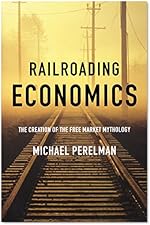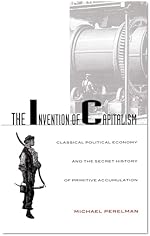The Ideological Fraud of Adam Smith, Beginning with the Pin Factory
SMITHThe first sign of Smith’s pin factory appeared in a course of lectures to his students in Glasgow in 1762 and 1763, more than a decade before the publication of his great book. The discussion of the pin factory began on March 28, 1763, while he was explaining to his Glasgow students the importance of the law and government:
They maintain the rich in the possession of their wealth against the violence and rapacity of the poor, and by that means preserve that useful inequality in the fortunes of mankind which naturally and necessarily arises from the various degrees of capacity, industry, and diligence in the different individuals. [Smith 1762 1766, p. 338]
In order to justify this inequality, Smith told his students that “an ordinary day labourer … has more of the conveniences and luxuries than an Indian [presumably Native American] prince at the head of 1,000 naked savages” (Smith 1762 1766, p. 339). But then the next day, Smith suddenly shifted gears, almost seeming to side with the violent and rapacious poor:
The labour and time of the poor is in civilized countries sacrificed to the maintaining of the rich in ease and luxury. The landlord is maintained in idleness and luxury by the labour of his tenants. The moneyed man is supported by his exactions from the industrious merchant and the needy who are obliged to support him in ease by a return for the use of his money. But every savage has the full enjoyment of the fruits of his own labours; there are no landlords, no usurers, no tax gatherers …. [T]he poor labourer … has all the inconveniences of the soil and season to struggle with, is continually exposed to the inclemency of the weather and the most severe labour at the same time. Thus he who as it were supports the whole frame of society and furnishes the means of the convenience and ease of all the rest is himself possessed of a very small share and is buried in obscurity. He bears on his shoulders the whole of mankind, and unable to sustain the weight of it is thrust down into the lowest parts of the earth from whence he supports the rest. In what manner then shall we account for the great share he and the lowest persons have of the conveniences of life? [Smith 1762 1766, pp. 340 41]
Smith’s train of thought is confusing. First, the law is needed to constrain the fury of the poor; then the market provides for the poor very well; followed by the wretched state of the people who worked on the land the least fortunate of the workers. For his grand finale, after decrying the “small share” of the poor, Smith curiously veers off to ask what accounts for “the great share” that these same people have. His answer should come as no surprise to a modern reader of Adam Smith “The division of labour amongst different hands can alone account for this” (Smith 1762 1766, p. 341).
By March 30, Smith was confident enough about his success in finessing the challenge of class conflict that he became uncharacteristically unguarded in openly taking notice of the importance of workers’ knowledge:
But if we go into the work house of any manufacturer in the new works at Sheffield, Manchester, or Birmingham, or even some towns in Scotland, and enquire concerning the machines, they will tell you that such or such an one was invented by some common workman. [Smith 1762 1766, p. 351]
Read the entire article here

 25 – The Confiscation of American Prosperity: From Right-Wing Extremism and Economic Ideology to the Next Great Depression
25 – The Confiscation of American Prosperity: From Right-Wing Extremism and Economic Ideology to the Next Great Depression 30 – Manufacturing Discontent: The Trap of Individualism in Corporate Society
30 – Manufacturing Discontent: The Trap of Individualism in Corporate Society Class Warfare in the Information Age
Class Warfare in the Information Age Railroading Economics: The Creation of the Free Market Mythology
Railroading Economics: The Creation of the Free Market Mythology Steal This Idea: Intellectual Property Rights and the Corporate Confiscation of Creativity
Steal This Idea: Intellectual Property Rights and the Corporate Confiscation of Creativity The Invention of Capitalism: Classical Political Economy and the Secret History of Primitive Accumulation
The Invention of Capitalism: Classical Political Economy and the Secret History of Primitive Accumulation The Perverse Economy: The Impact of Markets on People and the Environment
The Perverse Economy: The Impact of Markets on People and the Environment
That’s a hell of a good paper.
for reasons unknown to me the system administrator of the shasta county library blocked the full article from appearing on my screen because it “failed the virus scan”.
xxxxxxxxxxxxxxxxxxxxxxxxxxxx it seems that switching from google’s crome to microsoft’s no longer supported internet explorer has solved the problem.
so, i shall, over time be able to read the complete article.
xxxxxxxxxxxxxxxxxxxxxxxxxxx
thank you though it took me quite some while to finish; i believe it was worth the effort.